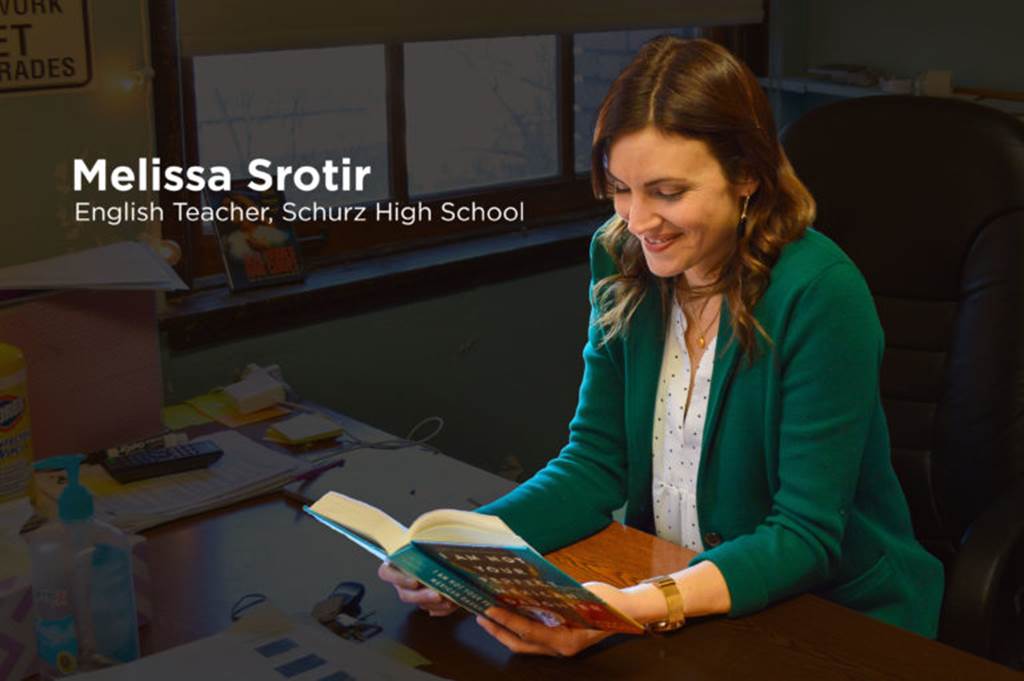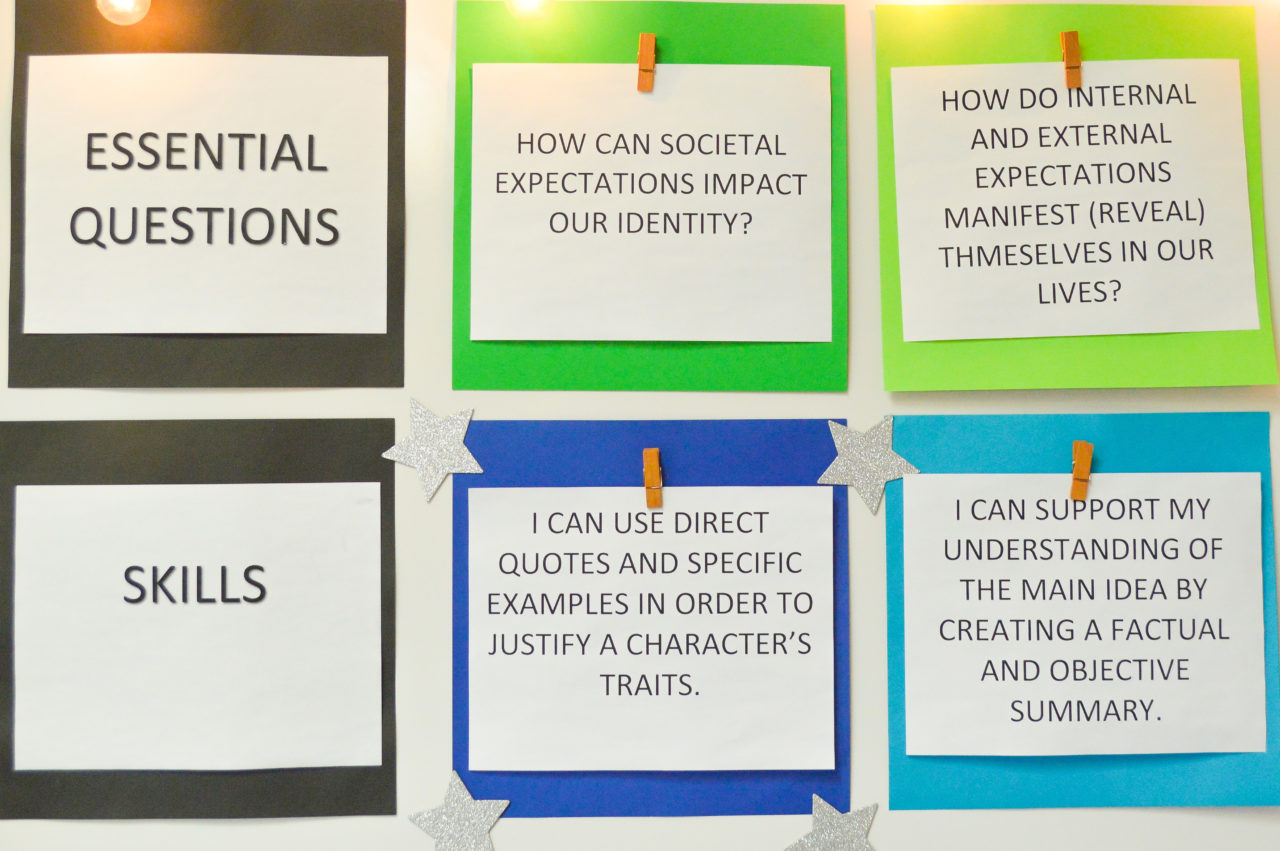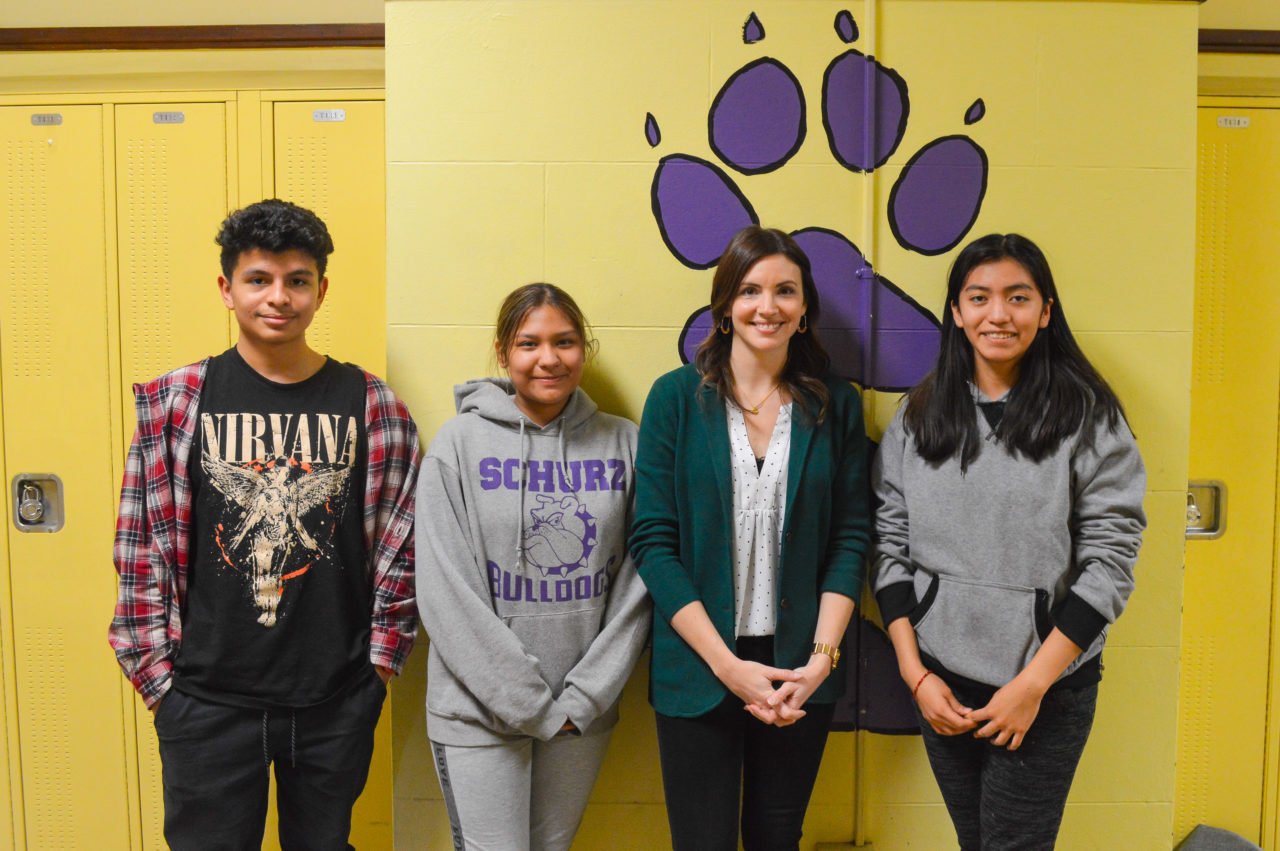A Bookshelf of Mirrors | Un librero de espejos
16 January 2020
At Carl Schurz High School in Chicago’s Irving Park neighborhood, string lights line the walls of ninth grade English teacher Melissa Srotir’s classroom all year long.

How Schurz Students Learn and Grow by Drawing on Their Own Experiences
At Carl Schurz High School in Chicago’s Irving Park neighborhood, string lights line the walls of ninth grade English teacher Melissa Srotir’s classroom all year long. Ms. Srotir says they are an important piece of creating a warm, engaging, and supportive classroom mood that reflects her teaching style. Since she started at Schurz as a student teacher in 2005, her curriculum has evolved to focus on depth, rather than breadth, to help her freshman students develop reading, writing, and critical thinking skills.
“As a teacher, when you get caught up in trying to accomplish everything, you ultimately just end up giving students a surface-level view of each text,” she said. “Then, you end the year burnt out and thinking ‘I didn’t do enough,’ and the kids are overwhelmed. It’s not good for anybody.”
At Schurz, English courses focus on diverse sets of “mirror” texts that reflect a range of students’ cultural backgrounds and experiences. As students strengthen their vocabulary and refine their reading comprehension skills, the texts progressively become more challenging.
Ms. Srotir says that texts that her majority Latinx freshmen relate to, including I Am Not Your Perfect Mexican Daughter—which has a teenage protagonist and takes place in Chicago—help them effectively learn how to use context clues to decipher challenging sentences and support their ideas with textual evidence. Complementary books like The Absolutely True Diary of a Part-Time Indian expand her students’ cultural perspectives while remaining grounded in accessible themes of identity and empowerment. By supporting each text with non-fiction articles, movies, and guiding thematic questions, Ms. Srotir says her students are learning how to use literature as a way to connect to the world.
“My hope is that every student is able to read a book that speaks to them in a personal way and they’re going to carry forward a meaningful connection to,” she said. “That’s going to be different for every student. Some students will come back and tell me that they really loved one of the novels that we read like The Hate U Give; others will tell me that ‘The Most Dangerous Game’ was their favorite short story.”

Ms. Srotir says she doesn’t even know why some students are so drawn to “The Most Dangerous Game,” which takes place on an abandoned Caribbean island, but she does know that each of her students enter Schurz with different interests and needs. Because of this, she incorporates social and emotional practices into her instruction to help students work through the pressures and anxieties they might be feeling as freshmen.
“Students will tell you what they need if you really listen,” she said. “Some of my students want you to be hard on them and have high expectations; others will need you to set aside some time to sit with them individually. Making a classroom challenging yet accessible for every student can be hard, and that’s why you need to individualize your instruction as much as you can.”
Ms. Srotir uses writing as a way to meet students where they are. She’ll push high-achieving students to take more risks in their written work—which she says is a big confidence boost for them—while supporting students who need help with foundational skills. Equity in her classroom means differentiated learning—instruction for every student tailored to their unique needs.
In addition to analytical writing, students also build writing skills through journaling. While Ms. Srotir largely gives her students the creative freedom to write about what they want, she occasionally uses journaling to reinforce important grammatical concepts or relate to the text that students are reading. This year, she’s found that most students are more passionate about writing than reading because it gives them an outlet to directly express themselves. Because of this, she tries to incorporate themes she knows students are writing about into classroom discussions, such as social justice and a love for their neighborhoods and communities.
After nearly fifteen years at Schurz, Ms. Srotir says she has no plans to ever leave. As each group of freshmen leave her classroom ready to take on more challenges as sophomores, she wants them above all to remember how her class made them feel.
“I hope my students remember that they were cared for and that I was here to listen and that they had a voice,” she said.


Cómo los estudiantes de Schurz aprenden y crecen usando sus propias experiencias
En la Escuela Secundaria Carl Schurz en el vecindario Irving Park de Chicago, durante todo el año, las paredes del aula de la maestra Melissa Srotir se encuentran llenas de cadenas de luces. La maestra Srotir, que enseña inglés de noveno grado, dice que estas cosas son importantes para crear en el aula un ambiente acogedor, atractivo y alentador que refleja su estilo de enseñanza. Desde que comenzó su carrera en Schurz como maestra practicante en 2005, su currículo ha cambiado para enseñar el contenido de una manera profunda y no superficial, a fin de ayudar a sus estudiantes a desarrollar habilidades de lectura, redacción y pensamiento crítico.
“Cuando un maestro se obsesiona por tratar de lograr todo, al final solo termina dando a los estudiantes una perspectiva superficial de cada texto”, dijo. “Luego, termina el año agotado, y pensando que no hizo lo suficiente, y los niños se sienten agobiados”. No es bueno para nadie”.
En Schurz, los cursos de inglés se centran en diversos conjuntos de textos de “espejos” que reflejan una serie de antecedentes y experiencias culturales de los estudiantes. A medida que los estudiantes fortalecen su vocabulario y refinan sus habilidades de comprensión de lectura, los textos se vuelven progresivamente más complejos.
La maestra Srotir dice que los libros con que se relaciona la mayoría de sus estudiantes latinos, incluyendo I Am Not Your Perfect Mexican Daughter— que tiene un protagonista adolescente y está ambientada en Chicago— les enseñan de manera efectiva a utilizar las pistas del contexto para descifrar oraciones complejas y justificar sus ideas con evidencia textual. Libros complementarios como The Absolutely True Diary of a Part-Time Indian amplían las perspectivas culturales de sus estudiantes, mientras que se basan en temas accesibles de identidad y empoderamiento. Al usar artículos de no ficción, películas y preguntas temáticas orientadoras para describir el contenido, la maestra Srotir dice que sus estudiantes están aprendiendo a utilizar la literatura como una manera de conectarse con el mundo.
“Espero que todos los estudiantes puedan leer un libro con el que puedan relacionarse de manera personal, y que se lleven con ellos esa conexión”, dijo. “Eso va a ser diferente para cada estudiante. Algunos estudiantes regresarán al aula y me dirán que les encantaron mucho una de las novelas que leímos como The Hate U Give; otros me dirán que The Most Dangerous Game fue su cuento corto favorito”.
La maestra Srotir dice que ni siquiera sabe por qué algunos estudiantes se sienten tan atraídos por “The Most Dangerous Game”, que está ambientada en una isla caribeña abandonada, pero sí sabe que todos sus estudiantes ingresan a Schurz con diferentes intereses y necesidades. Por eso, incorpora prácticas sociales y emocionales en su enseñanza para ayudar a los estudiantes a trabajar con las presiones y ansiedades que podrían experimentar durante su primer año de la secundaria como freshmen.
“Los estudiantes te dirán lo que necesitan si realmente los escuchas”, dijo. “Algunos de mis estudiantes quieren que seas exigente con ellos, y que tengas altas expectativas. Otros necesitarán que reserves un poco de tiempo para trabajar con ellos individualmente. Hacer que las clases sean complejas y a la vez accesible para todos los estudiantes puede ser difícil, y es por eso que necesitas individualizar tu enseñanza tanto como puedas”.
La maestra Srotir utiliza la redacción como una manera de adaptarse a los niveles de conocimiento de los estudiantes. Ella motiva a los estudiantes de alto rendimiento a tomar más riesgos en su trabajo de redacción—lo que dice que estimula mucho su confianza en sí mismos— mientras que apoya a los estudiantes que necesitan ayuda con las habilidades fundamentales. La equidad en su aula significa aprendizaje personalizado: enseñanza adaptada a las necesidades únicas de cada estudiante.
Además de la redacción analítica, los estudiantes también desarrollan habilidades de redacción a través del diario. Aunque la maestra Srotir le da a sus estudiantes la libertad creativa de escribir de lo que quieran, de vez en cuando usa el diario para reforzar importantes conceptos gramaticales, o para relacionarse con el contenido que leen. Este año, se ha dado cuenta que a la mayoría de los estudiantes les apasionan más la redacción que la lectura, porque les da un medio para expresarse directamente. Debido a esto, se esfuerza por incorporar los temas de redacción que se tratan en las discusiones de las clases, como la justicia social y el amor por sus vecindarios y comunidades.
Después de casi quince años en Schurz, la maestra Srotir dice que no tiene planes de irse nunca. A medida que cada grupo de estudiantes freshmen salen de su aula listo para asumir más desafíos como estudiantes sophomores, quiere que ellos recuerden cómo su clase los hizo sentir más que nada.
“Espero que mis estudiantes recuerden que fueron atendidos, que yo estaba aquí para escucharlos, y que ellos tenían una voz”, dijo.
Related Stories
09 May 2025
Learning Alongside My Students: Take Five with Melissa Flisk
Ms. Flisk strives to create a calm and welcoming environment that celebrates her students’ interests, needs, skills, and personalities.
07 May 2025
Learning All About an Amazing Art Educator for Teacher Appreciation Week
Natalie loves working with students, especially those who enter her classroom without a lot of confidence in their abilities.
07 May 2025
Celebrating Teacher Appreciation Week with an Outstanding Third-Grade Educator
Reem is doing an amazing job in her first year leading a classroom of her own.
05 May 2025
Making the World a Bigger and Better Place for Students with Visual Impairments
Ms. Segroves is dedicated to providing students with direct instruction and accommodations to help them access everyday instruction.




